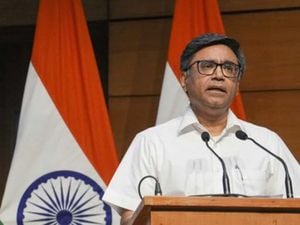On Wednesday, May 7, 2025, Patricia Ramírez, the mother of Gabriel Cruz, who was tragically murdered in 2018, held a press conference to voice her ongoing struggles and fears regarding the treatment of victims in the Spanish justice system. Ramírez's emotional appeal highlighted her sense of abandonment and lack of protection by authorities, especially in light of recent revelations about the prison conditions of her son's killer, Ana Julia Quezada.
During the press conference, Ramírez disclosed alarming information she had received from sources within the Brieva women's prison in Ávila, where Quezada is serving a life sentence. She stated that Quezada had made threats against her life, reportedly saying, "She said she wants to kill me." This threat was allegedly made in retaliation for Ramírez's efforts to halt a documentary Quezada was producing about Gabriel's murder, which Ramírez vehemently opposes.
Ramírez's concerns were compounded by a recent report from EL PAÍS, which revealed that several prison officials are under investigation for allegedly engaging in sexual relationships with Quezada in exchange for providing her with a mobile phone. This phone was reportedly used by Quezada to conduct interviews with journalists and to record compromising situations involving prison staff, which she could then use for blackmail to secure a transfer to a more lenient facility in Barcelona, where her partner resides.
Since her son's murder, Ramírez has spent six years navigating the complex and often unresponsive judicial system, seeking protection and being heard by various authorities. She has personally informed high-ranking officials, including the Secretary of State for the Interior, Rafael Pérez, and the Secretary of Penitentiary Institutions, Ángel Luis Ortiz, about the irregularities she has uncovered. Despite her efforts, she feels that her pleas have largely gone unaddressed.
Fernando Galeano, the Subdelegate of the Government of Ávila, confirmed that the two officials primarily involved in the allegations against Quezada are no longer working at the prison. However, Ramírez expressed her frustration at the lack of meaningful action taken on her reports of Quezada's privileges within the prison, which included access to multiple mobile phones and various unauthorized activities.
"If this is protecting a victim, then God tell me otherwise," Ramírez lamented, reflecting on her feelings of despair and helplessness. She further elaborated that she had submitted a second complaint in December 2024, fearing for her life after learning of Quezada's fury over the halted documentary. "I have been informed that she was very angry because I interrupted the documentary, which had financial backing through her lawyer," Ramírez said.
Ramírez's situation has been exacerbated by the fact that her personal data, including her phone number and address, were included in the investigation files. She reported receiving strange calls, which added to her anxiety and concern for her safety. Despite her attempts to file a complaint regarding possible threats, her case was initially dismissed, prompting her to seek legal assistance from a pro bono lawyer, as she could not afford further legal fees.
In her heart-wrenching testimony, Ramírez described her life as one filled with fear and psychological distress, stating, "I don't live, they don't let me live." She emphasized her commitment to continue speaking out, not just for herself, but for all victims who have suffered similar fates. "When victims remain silent out of fear, we lose the ability to defend our rights, and others take advantage of our silence," she asserted.
Ramírez's advocacy extends beyond her personal experience; she aims to raise awareness about the broader issues of victim protection within the Spanish legal system. She has called for legislative changes that would prevent offenders from profiting from their crimes through media portrayals and to ensure that victims' rights are upheld. "We cannot allow our murderers to become famous while victims are ignored," she stated emphatically.
As the press conference concluded, Ramírez expressed her hope that her public denunciation would compel the Ministry of Interior and Justice to treat her with the respect she deserves as a victim. She remains determined to fight for justice and ensure that her son's memory is honored and protected.
This tragic situation underscores the challenges faced by victims and their families in navigating a system that often seems more accommodating to perpetrators than to those they have harmed. Ramírez's story is a poignant reminder of the need for reform and greater accountability within the justice system, particularly regarding the treatment of victims and their rights.





